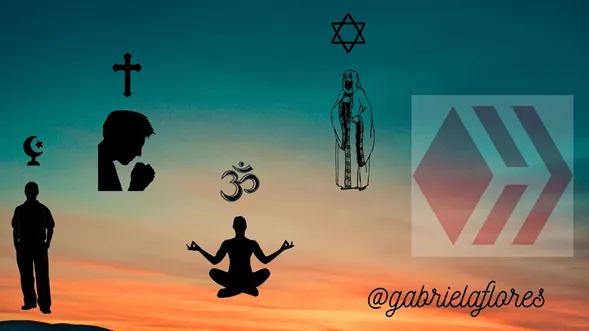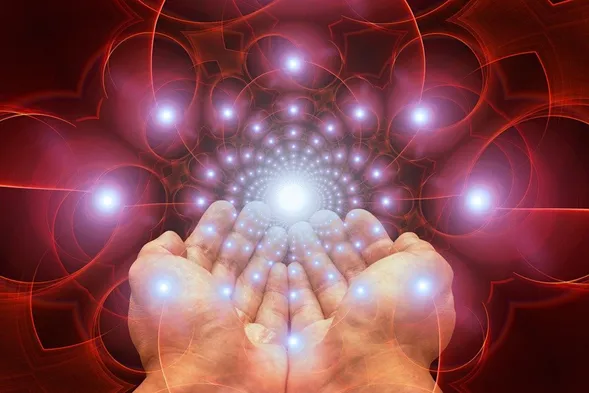Otra de las respuestas que se le puede ofrecer a esta pregunta es tomando en consideración cada una de las religiones que conocemos en la actualidad las cuales toman una “divinidad subyacente” por decirlo de alguna forma, quizás oculta entre esos mismos hombres fallecidos y entre ellos mismos aún en la tierra, un Dios desconocido.
Another answer that can be offered to this question is taking into consideration each of the religions that we know today, which take an "underlying divinity" so to speak, perhaps hidden among those same deceased men and among themselves. themselves still on earth, an unknown God.
Por ejemplo para la religión Católica la relación que establece cada creyente con Dios es sumamente importante por lo cual este debe conocerle, no obstante se tiene la idea de que la idea de Dios es abstracta, realmente comprenderle no cabe dentro de la mente humana. En sentido general la religión católica enseña que Dios es nuestro padre y Jesucristo su hijo directo y salvador, por lo tanto un modelo a seguir en la tierra./div>
For example, for the Catholic religion, the relationship that each believer establishes with God is extremely important, which is why he must know him, although there is the idea that the idea of God is abstract, really understanding him does not fit within the human mind. In a general sense, the Catholic religion teaches that God is our father and Jesus Christ is his direct son and savior, therefore a model to follow on earth.
Jesús lo dice en numerosas ocasiones en el Evangelio, y en san Lucas 11,5-13 deja bien claro el concepto de padre del que habla: "Pedid y se os dará, buscad y hallaréis, llamad y se os abrirá; porque quien pide recibe, quien busca halla, y al que llama se le abre. ¿Qué padre entre vosotros, cuando el hijo le pide pan, le dará una piedra? ¿O si le pide un pez, le dará una serpiente? ¿O si le pide un huevo, le dará un escorpión? Si vosotros, pues, que sois malos, sabéis dar cosas buenas a vuestros hijos, ¿cuánto más vuestro Padre celestial dará el Espíritu Santo a los que se lo piden?"
Jesus says this many times in the Gospel, and in Saint Luke 11: 5-13 he makes the concept of the father very clear: "Ask and it will be given to you, seek and you will find, knock and it will be opened to you; whoever seeks finds, and to the one who knocks it is opened. What father among you, when the son asks for bread, will give him a stone? Or if he asks for a fish, will he give him a snake? Or if he asks An egg, will he give him a scorpion? If you, then, who are evil, know how to give good gifts to your children, how much more will your heavenly Father give the Holy Spirit to those who ask him? "
En cuanto a la religión musulmana se considera que su Dios es el mismo venerado por los católicos y judíos, es decir, el dios abrahámico, no obstante estos le llaman Alá el cual continúa siendo incognoscible, pero se puede conocer, misericordioso, aunque no tiene causa justa para ella. Estos son monoteístas y para ellos Dios es completamente impersonal.
As for the Muslim religion, it is considered that its God is the same one venerated by Catholics and Jews, that is, the Abrahamic god, however they call him Allah who continues to be unknowable, but can be known, merciful, although he does not have just cause for her. These are monotheis and to them God is completely impersonal.
Señalan Daniel y Rich en su artículo “El punto de vista del islam sobre Dios y su revelación”:
En otras palabras, él no es sólo monoteísta sino un ser completamente distinto, único, indivisible, y un ser completamente separado (impersonal) quien es incognoscible por seres "personales" como nosotros. Alá existe sin un lugar, independiente de la creación, sin parecido a sus creaciones. Nada en toda la creación se puede comparar a Alá.
Daniel and Rich point out in their article "Islam's Viewpoint on God and His Revelation":
In other words, He is not only monotheistic but a completely different, unique, indivisible being, and a completely separate (impersonal) being who is unknowable by "personal" beings like us. Allah exists without a place, independent of creation, without resemblance to his creations. Nothing in all creation can compare to Allah.
Ahora bien, existe un cambio extraordinario en cuanto a la visión de Dios dentro de las religiones o filosofías orientales puesto que estas aunque señalando lo mismo no encierran o enmarcan a ese “Dios” dentro de una palabra como “Alá” o dentro de un nombre representativo como “Jesús” o “Mahoma”. Para estas filosofías la idea de Dios no se refiere a un hombre sino a todos los hombres puesto que es una energía, una experiencia, una forma de ver la vida y sentir que yace en cada ser humano y que cada uno podemos descubrir dentro de nosotros como lo hizo Buda por ejemplo para el budismo.
Now, there is an extraordinary change in terms of the vision of God within Eastern religions or philosophies since these, although pointing out the same, do not enclose or frame that "God" within a word such as "Allah" or within a name. representative as "Jesus" or "Muhammad." For these philosophies the idea of God does not refer to a man but to all men since it is an energy, an experience, a way of seeing life and feeling that it lies in each human being and that each one of us can discover within us. as Buddha did for example for Buddhism.

Indiferentemente del término que acuñemos para ello bien sea Dios, energía, padre, madre, fuente o luz esto se refiere siempre y en todo momento a una misma experiencia que cada hombre puede alcanzar. En este sentido, dentro de cada hombre reside Dios puesto que cada hombre es DIos pero no sólo cada hombre sino también cada cosa que existe en este mundo proviene de Dios y por lo tanto es Dios. En este sentido Dios es todo pero a su vez es más que eso porque abarca cada cosa, cada espacio, es eterno y se puede conocer o experimentar su consciencia mediante prácticas como la meditación, yoga, rituales y prácticas alimenticias, etc.
Regardless of the term we coined for it, whether it be God, energy, father, mother, source or light, this always refers to the same experience that each man can achieve. In this sense, within each man God resides since each man is God but not only each man but also everything that exists in this world comes from God and therefore is God. In this sense, God is everything but at the same time he is more than that because he encompasses everything, each space, he is eternal and his consciousness can be known or experienced through practices such as meditation, yoga, rituals and eating practices, etc.
Pero entonces ¿Dios es el mismo en todas las religiones? Parece que sí, aunque tal vez la pregunta no sería esa sino ¿Es la idea de Dios la misma en todas las religiones? Parece que no, aunque en lo más profundo de cada una de ellas, en su esencia todas apuntan al mismo Dios o energía divina.
But then is God the same in all religions? It seems that it does, although perhaps the question would not be that but Is the idea of God the same in all religions? It seems not, although in the depths of each one of them, in their essence they all point to the same God or divine energy.
Gracias a todos por leerme, estuve unos días alejada de la plataforma pero han sido días de profunda conexión y acercamiento con Dios y por ello me inspiré a escribir este artículo. Gracias a todos mis lectores y a las comunidades que constantemente me apoyan como @cervantes, @gems y @naturalmedicine.
Thank you all for reading me, I was away from the platform for a few days but they have been days of deep connection and closeness with God and that is why I was inspired to write this article. Thanks to all my readers and the communities that constantly support me like @cervantes, @gems and @naturalmedicine.

Me gustaría como es de costumbre invitarlos a darse un paseo por mis redes sociales:
As usual I would like to invite you to take a walk through my social networks:







